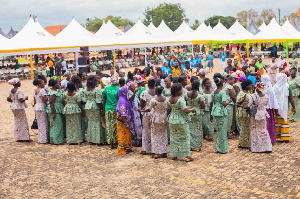- Home - News
- TWI News | TV
- Polls
- Year In Review
- News Archive
- Crime & Punishment
- Politics
- Regional
- Editorial
- Health
- Ghanaians Abroad
- Tabloid
- Africa
- Religion
- Election 2020
- Coronavirus
- News Videos | TV
- Photo Archives
- News Headlines
- Press Release
General News of Thursday, 19 April 2012
Source: --
Ghgbc Launches The Eco Communities National Framework
Ghana Green Building Council (Ghgbc) Launches The Eco Communities National Framework
The Ghana Green Building Council has taken yet another bold step in creating a sustainable environment with the launch of the Eco Communities National Framework at a well at the British Council Hall.
The launch which took place on the 28th of March was chaired by the Hon Dr. Hannah Louisa Bisiw, Deputy Minister for Water Resources works and Housing, with key note address coming from Hon. Sherry Ayittey- Minister for Environment Science and Technology.
The Eco Communities National Framework is a vision, a set of guided principles and aspirations serving as the basis for the development of the rating tool for communities, neighborhood, and cities development in Ghana. The aim of this framework is to create a platform, provide inspiration and contribute to national development on how we plan, design, construct, operate and maintain and renew sustainable communities in Ghana.
In his address, Mr. Foster Osae-Akonnor, Chief Executive of the Ghana Green Building Council observed that Ghana is growing at a rapid pace, exemplified by increase in construction activities, influx of foreign investments, oil find among others which threaten the sustainability of our environment in a big way. He reiterated that the Ghana Green Building Council currently stands as the institution of choice to partner government and all stakeholders in the building and construction industry, including allied industry and bodies to lead the development of a rationale that could help create a greater demand for more sustainable development projects at a community scale.
He was speaking on the Eco-Communities rating tool (Green Star Gh. Eco Communities) which he said is being developed in two stages; The first stage which involves the development of a national framework for sustainable communities will establish five national best practice principles to guide all sustainable communities development (either new developments or revitalization) in Ghana.
The second stage he said deals with the development of the rating tool which provides best practice benchmarks informed by the framework and used for assessing Eco-Communities. In the end, these will be the benchmarks by which all sustainable building development projects will be measured.
In her speech, Dr. Bisiw said that estimates have it that Cities cover less than 1% of the earth’s surface but are responsible for up to 75% of the world’s greenhouse gas emissions, and bemoaned the challenge this poses for both government and Civil Society. She highly commended GHGBC for the initiative and pledged governments’ commitment to the cause of the Council.
In her key note address also, Hon. Sherry Ayittey said that “Green industry is at the core of sustainable development as it combines poverty reduction through productive activities and job creation with an increase in the environmental sustainability of industrial activity. Green industry equips business to make a leading role in developing and applying safe, resource efficient and climate-resilient technologies in the process”. She therefore called on all to support the initiative through volunteerism, technical know-how and the financial resources “for the development of a better Ghana in a sustainable manner for both the present and the future generations”.
The Ghana Green Building Council is a membership-based organization that is committed to help create sustainable building and communities in Ghana using energy savings, water conservation, resource management and cost-efficient techniques.
The council was established on August 12th 2009 with the mission to transform the built environment in Ghana towards sustainability through the way communities are planned, designed, constructed, operated and maintained. The council is collaborating with the ministry of Environment Science and Technology, Ministry of Local Government and Rural Development, Ministry of Water Resources Works and Housing among other department and Agencies, Institutions of Higher Learning and Organizations.










